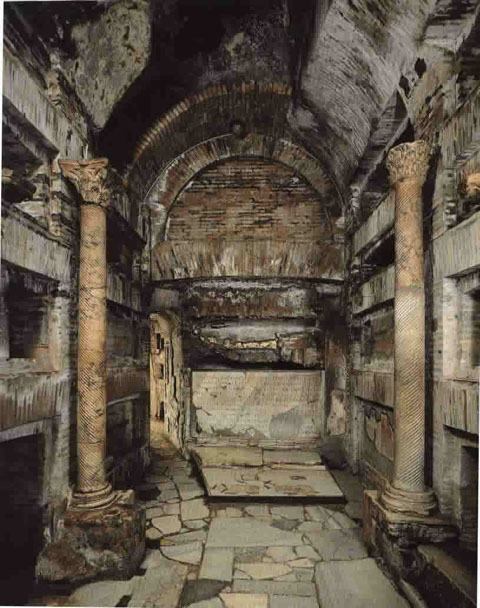“Tell me what you sing and I’ll tell you who you are:
Developing a Congregational Identity through Congregational Singing”
with Dr. C. Michael Hawn
Sundays, August 4 – September 1, 2019
9:45 a.m., Fellowship Hall
The Holland Lectures, previously known as The Catacombs Lectures, is an annual series at the end of the summer sponsored by the Shepherd-Holland Bible Study class. The lectures take place during the Sunday School hour, but you do not have to be in a Sunday School class to attend the series. On January 15, 2017, the class voted unanimously to rename the class the Shepard-Holland Bible Study Class, and the Catacombs Lectures, the Holland Lectures, in memory of Dr. Henry Holland.
We hope to record all the lectures, posting them on our website.
Lectures:
 C. Michael Hawn is one of our nation’s leading experts in hymnology and world music. Now a Richmonder, he recently retired after 25 years from Perkins School of Theology, Southern Methodist University, as University Distinguished Professor Emeritus of Church Music and director of the Sacred Music Program. Previously he taught at two Baptist seminaries for a total of 15 years. He leads festivals and publishes extensively in the area of hymnology, is the USA Editor for the Canterbury Dictionary of Hymnology, and writes a weekly hymn studies column entitled History of Hymns. A student of global Christian music, Hawn has conducted research and taught in over 40 countries. In addition, he has sung extensively as a countertenor and is a recovering accordion player.
C. Michael Hawn is one of our nation’s leading experts in hymnology and world music. Now a Richmonder, he recently retired after 25 years from Perkins School of Theology, Southern Methodist University, as University Distinguished Professor Emeritus of Church Music and director of the Sacred Music Program. Previously he taught at two Baptist seminaries for a total of 15 years. He leads festivals and publishes extensively in the area of hymnology, is the USA Editor for the Canterbury Dictionary of Hymnology, and writes a weekly hymn studies column entitled History of Hymns. A student of global Christian music, Hawn has conducted research and taught in over 40 countries. In addition, he has sung extensively as a countertenor and is a recovering accordion player.
Congregational singing both forms our individual faith perspective, but also shapes us as the body of Christ in community. These lectures will examine our hymnic heritage that have shaped our faith, look at some trends that are currently influencing the ecumenical church, and consider the cultural, societal, and ethical issues that inspire what we might sing in the future.
“Tell me what you sing and I’ll tell you who you are.” — Albert van den Heuvel (World Council of Churches, 1966)
August 4: Ten (or more) Hymns That Have Shaped Baptist Faith Perspective
Each tradition is shaped by the faith they sing. What have Baptists contributed to the wealth of congregational song, for example, in the areas of scriptural integrity and religious freedom? What Baptists are writing hymns today and what are they saying? You may be surprised!
August 11: Ten (or more) Classic Hymns Everyone Should Sing and Why
This session will focus on some of the favorite classic hymns and why they are still important to shaping our faith. Some include “Amazing Grace,” “Be Thou My Vision,” “Praise to the Lord, the Almighty,” “Holy, Holy, Holy,” “Love Divine, All Love’s Excelling” and others. Why do we still sing them? What do these “songs of the saints” say about the Christian community?
August 18: The Meditative and Prayerful Music of the Taizé Community
What can Christians sing together if they come from different countries, speak different languages, and have been nurtured in a wide range of Christian perspectives? For seventy years, an ecumenical monastic community in the village of Taizé in southeastern France has been a point of pilgrimage for young people from around the world. Amenities are spartan; Internet is sporadic; food is simple; the community is authentic and spiritually rich. What can we learn from Taizé song and this way of praying?
August 25: Ten (or more) Hymns Written in the Twenty-first Century Everyone Should Learn
“Each generation must add its stanza to the great hymn of the church,” says my friend United Methodist Bishop Joel Martinez. What is our age saying about our faith and life that has not been said before? As important as it is to sing the songs of the saints, a vital sung faith should also incorporate the “new song” (Psalm 96:1). New songs, if chosen well, can point us in the direction the church should be heading. Yes, we can sing our way to a more faithful church.
September 1: Singing Love in a Culture of Hate
As strange as it may seem, singing together has the potential to stem hate. The great commandment: “Love God and love your neighbor as yourself” (Mark 12:30-31; Matthew 22:36-40; Luke 10:27) is rarely quoted in an age of division and hate. Perhaps we need to take what we sing in our sanctuaries to the streets. The Civil Rights Movement of the 1960s is perhaps the most powerful recent example of this. Somehow the songs of this era have given way to strident shrieks and slogans of hate. What might we sing that brings disparate groups – economically, ethnically, politically – together for the good of humanity…

